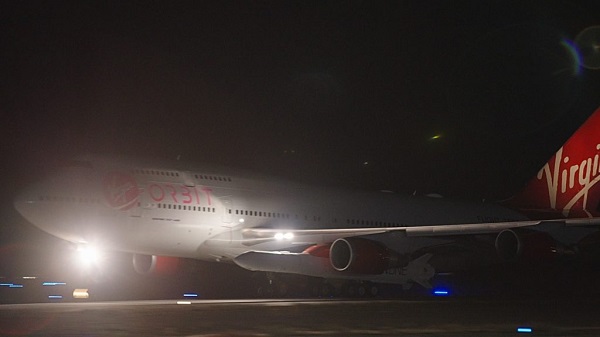Washington, (Asian independent) Billionaire Richard Branson’s Virgin Orbit has successfully launched seven satellites to low Earth orbit for the United States Space Force (USSF) in its fourth consecutive satellite launch mission, and first conducted during night.
The launch, named Straight Up, began at 10:50 p.m. local time on July 1 (8:20 am IST), and concluded with the successful deployment of all seven payloads at approximately 12:55 a.m. Pacific (1:25 pm IST) on July 2, the company said in a statement.
Virgin Orbit’s fully mobile LauncherOne system conducted its first ever evening flight from a bare concrete pad and a runway at the Mojave Air and Space Port in California.
The launch reached an orbit approximately 500 km above the Earth’s surface at 45 degrees inclination. This was Virgin Orbit’s second time reaching that inclination — an orbit that no other system has ever reached from the West Coast.
The seven satellites deployed by the Straight Up launch are from multiple government agencies and will facilitate experiments intended to demonstrate innovative spacecraft technologies, new approaches for satellite applications, and Earth atmospheric science, the company said.
“There is so much potential benefit for everyone from space if we just manage it well together. We are delighted for the opportunity to work with the US government to help make space a safe and fruitful environment for all,” said Virgin Orbit founder Richard Branson, in a statement.
The launch’s name, Straight Up, is inspired by American singer Paula Abdul’s breakthrough song from her debut studio album, Forever Your Girl. Released through Virgin Records on June 21,1988, it was the most successful debut album ever at the time of its release. The iconic dance-pop tune has remained Abdul’s biggest international hit to date.
In April 2020, Virgin Orbit National Systems was awarded a contract to launch this mission, also dubbed STP-S28, by the USSF as a three-launch mission. STP-S28A is the first of those launches.
In total, Virgin Orbit has made five launch attempts. It failed once during its first test flight in May 2020. It first reached orbit in January 2021, deploying a set of satellites into orbit in June 2021 and completing yet another mission earlier this year.
The company’s next international launch, scheduled later this year, is in collaboration with the UK Space Agency, the Royal Air force, and Space Port Cornwall. This will be the first orbital launch ever from UK soil.








